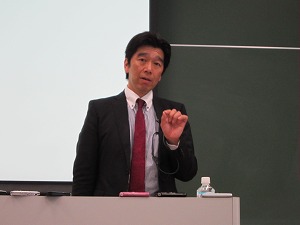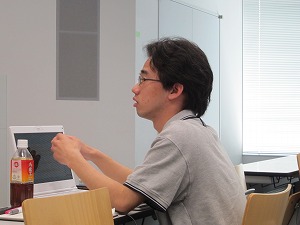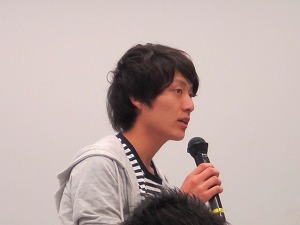2011 Hosei University
「Global Governance」
■Lecturer: Prof.Tomonori Yoshizaki
■Date: 25 May 2011
■Contributor: Minshink Kim, Sayuri Maruyama, Eri Iijima
*************************************
<講義概要>
1. Japan as the peace-creating nation.
(1)
This is a pretty new concept. This concept of peace-creating nations is introduced in reports and recommendations of the prime minister office, which means Japan should become a peace-creating nation whose message assents from the expert of the international affairs security studies. The first agenda, like proposed actor implication, is crisis management. After the first came the TSUNAMI on March 11th. We witnessed the many damages and the death of many people and locals affected. Now more than 1,000,000 self-defense forces are now being ported to rescue or reconstruct those who are affected and their accommodations. That is the national crisis. What we think about neighbors like a North Korean missile or “Senkaku issue” like Japan’s silent conflict between these is a hot issue for us. So whether or not we have a good neighbor is a vague good in this study point about our security architecture. The second agenda is civil military cooperation or coordination that is a base clear line. Self-defense forces wear uniforms. They have a special status provided by international law. A person in uniform can carry a gun, or a turretin fifteen or some aircraft which are very dangerous if we misuse them. In that sense, civilians and military are indifferent, but where we talk about the TSUNAMI or Tohoku disaster, global cooperation, in some way or another, for those who are in danger or in trouble. So we will go hand-in-hand in order to overcome disasters or the risk of war. The challenge is civil integration, and the last one is a conclusion about Japan’s soft power.
(2)
The first one question is, “Is a war among major powers unlikely?” About 30 years ago, there was the Cold War in which the US-Soviet nuclear exchange accosted both of the less serious vessels, meanwhile we were thinking about mushroom clouds after nuclear devastation, and that was a simply nightmare. Now, for those we have North Korean challenges or the Chinese-Japanese rivalry, we don’t think about a war coming soon. The second question is, “Do you think it legitimate to take all necessary means in order to stop mass killing or protect innocent civilians like kids or girls in foreign countries?”. Basically, sovereignty means that the sovereign state can enjoy full-state rights. It also means they can say, “No,” to stop incoming forces. So, in that sense, the coming to foreign countries for and use forces is illegal. But, in some cases, we can do it. The last question is, “ What do you think the major role of self-defense forces is?” To be specific, the point in here is that self-defense forces are not using force and using weapons to kill the local people in international operations. That means we will limit ourselves to defending by using weapons. In that sense, if you are in peace operations or refugee camp in a disaster area, and you may happen to be in the same sight as the self-defense forces. In Sudan, Somalia, or Haiti, you may ask self-defense forces to guard you. But what we can provide for civilians is quite limited. If you are in our camp, we can do it. But if you want to be away from self-defense forces camp, we can’t. Basically, the defense of Japan is our main mission, and the peace-keeping operation and international operations are other main missions as well. Also we are very limited in our capacity of using weapons. These are initial thoughts the first kaput of this one. This is Japan as a peace-creating nation. Japan loves the concept of peace. But real challenge question is how to make it happen, and how to make peace in war.
2. Three actors about the peace-creating nation and a new focus on human security and peace-building
(1)
First is the new administrations near the new concept. Under LDP from 1955 to 2009, basically we have the two pillars: self–defense forces for national defense and another one is the dependence of US-Japan security alliance. The focus now is non-traditional security, human security, and peace-building. After the Cold War, we tried to have a new clip about what was happening in this part of globe like North Korean activities and cooperation of the weapons of mass destruction, terrorism, drugs, or human kidnapping. So, the point is here that Japan’s new focus is again a non-traditional aspect of security: civilian-led effort, not military-led effort. Perhaps capacity-building of nation is quite important. We will provide them with vocational training or an opportunity for local factories or an engineer to find their own place in their local committee. A second one is the new government on the new policy tool, like a national security council. Because in 50 years of JDP they have their own assets in capability and network.
(2)
What is the JDA? The answer is Japan Defense Agency. Four years back, we remained the ministry of defense. And from a very bureaucratic point of view, it is a very big change. Before having this name, agency means one of the branches under the prime minister office or cabinet office. That means we can’t have our own finance, so it is a kind of buffer. Why isn’t the JDA ministry of defense considering Ministry of Foreign Affairs and Ministry of Finance? It is very closely related to the self-defense forces of Japan, and not the army, navy or air force. Self-defense forces became a reality in 1954, nine years after the session of hostility. Now we still have self-defense forces, but we have no army, navy, or air force. We don’t call them army or navy or air force for political reasons. As for the JDA, JDA means we were under the direction of the prime minister office which means we can’t move our forces without the apparent recognition and authorization of the prime minister office. These are the key points of civilian control of armed forces. What happened in the Pacific Ocean War was that we had a Kanto-gun in the Manchuria. There was no political control over the imperial army. That was a disaster. So, regarding the JDA it’s one symbol that the prime minister office is responsible in taking control of all ministry, having the say in budget equipment personal training. Another one is international peace cooperating activity as a primary mission. What does it mean? Peace-keeping is a primary mission. However until 1992, IPCA was something well beyond reach simply because we had gigantic forces in China from 1930 to 1940. We occupy Singapore, Malaysia and Indonesia, and we had a direct attack upon Australia, the United States, the British forces, and the Dutch forces. International cooperating activity is very close to the imperialistic coach or aggressions. Before 1992, we had no foreign mission outside our territory except some of the training or ship visit simply because the world didn’t trust us. Now, time have changed. IPCA is now common sense.
3. Our government has three primary objectives in our defense posture.
(1)
First is to eliminate threats. Second is international security environment based in fortune so we’ll cooperate. Last is creating global peace and stability and to secure human security for the first time in our history; this is specified as one of the primary forces: human-centered views and protecting people. That is the essence of the human security concept. To be more detailed, the key word is collecting security and selective security. Collective security is very simple. It is like the UN, so it is very official. However, selective security is very informal concept but pretty new. Presidents Obama and Sarkozy say in the same article that our duty and our mandate under United Nation security council resolution says to protect civilians. It is not to remove Gaddafi by force, but it is impossible to imagine the future of Libya with Gaddafi in power. So, this is very subtle way of saying that we want the regime changed without specific notion of direct involvement of Gaddafi.
4. Legitimacy of Intervention
Next he talked about the legitimacies of intervention. There are five criteria. The first is the thread must be very serious. It means there must be a situation in which the conflict will not be solved without the intervention of international society. The second is that there must be proper purpose like to protect civilians and to stop massive killing or rape. The third is diplomatic and economic parts. If we use armies to stop the conflicts, we have accountableness for international society. We must avoid collateral damage and the damage must be minimum. The last criterion is a balance of consequences; it’s very difficult. The key word of that is to do no harm. To do intervention is to change the local balance of power. We have to think about what will be happen after the intervention. And we have to have responsibility of that.
5. NATO and UN’s Military Diplomacy
Now NATO has the top number of military diplomacies. The second is the UN. NATO and UN’s military diplomacy are increasing this year. NATO and UN work together in the global arena, but the problem is the stuff. Basically highly trained stuff like headquarters come from advanced country. But the UN has the most candidates from India, Bangladesh and Pakistan. Then ask NATO if they have a good relationship between the headquarters and the organization, but to ask UN, they have difficulty make efficient even when they have a larger number of operations.
6. Cause of Conflicts and New Challenges
In Afghanistan, Iraq, Sudan, Libya, and Somalia there is pre-modern conflict because there is a serious lack of good governance or lack of human security. New national program guideline has the incline of human security. Interventions by industrial advanced powers like the U.S., the UK, or France are done in the case of Libya. The important point is that for the UN and Britain, this is a post-modern conflict. However, for the countries to be affected, it is a pre-modern conflict. There are frequent challenges that include natural disaster because within five years we have many natural disasters that attack the countries seriously.
Questions:
1. Is the global power major war power or not?
2. What is the case of Libya, focusing on the civilians?
3. Law of self-defenses?
Answer
1- No major power is not major war because they know that if there is war, lots of people will die.
• Limited war may happen or scare.
2- Limited necessary means
The Security Council has the only organization that shows legitimacy of all necessary means, but it depends on the political situation. In most cases we think about the United Nations’ and Security Council’s resolutions.
Questions to Mr. Yoshizaki
1. How does NATO use these bombs – for attacking people or protecting people?
-We have very limited information about the number of suffered people by NATO’s action. But, basically NATO has a mission doing legitimate operation.
2. What is the difference between a peace-creating nation and a peace-building nation?
-Peace-making is politicized in order to have new name. Peace-creating is not normal concept, because creating peace isn’t used in determination: it’s a new approach or kind of passion under government.
3. Why should we care more about humanitarian intervention or the human right issues? And what is the turning point in our attitude?
-Turning is cold war. During war, we care most about nuclear issues or arm aggression. But, after the cold war, we can employ some force in order to have good governance. Peace-keeping-operations is obvious example. But sovereignty nation still have highest authority to say NO even though they have bad report of governance. There is need for international community to go beyond the traditional lines of understanding.
The next turning point is Kosovo and humanitarian intervention doctrine was tested.
4. Do you think that Japan defense-forces should have an army or navy force?
-We will not have arm forces in order to have settlement of international dispute. If Japanese say that we should be more responsible for army or navy force of the size of separate forces equipment for itself. (MINSHIK KIM)


